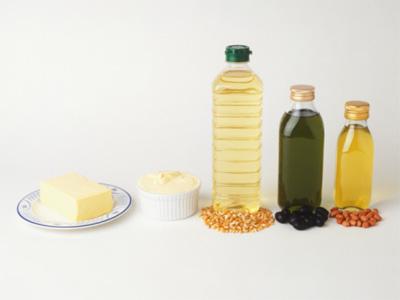
Vegetable Oils
Vegetable oils are natural oils found in seeds, nuts and some fruit. The oil can be extracted. The plant material is crushed and pressed and the oil, eg olive oil, is squeezed out.
Sometimes the oil is more difficult to extract and has to be dissolved in a solvent. Once the oil is dissolved, the solvent is removed by distillation and impurities (such as water) are also removed. This leaves pure vegetable oil, eg sunflower oil. Molecules of vegetable oils consist of glycerol and fatty acids.
Saturated and unsaturated fats and oils
The fatty acids in some vegetable oils are saturated - they only have single bonds between their carbon atoms. Saturated oils tend to be solid at room temperature, and are sometimes called vegetable fats instead of vegetable oils. Lard is an example of a saturated oil.
The fatty acids in some vegetable oils are unsaturated - they have double bonds between some of their carbon atoms. Unsaturated oils tend to be liquid at room temperature, and are useful for frying food. Unsaturated fats (rather than saturated fats) are thought to be a healthier option in the diet.